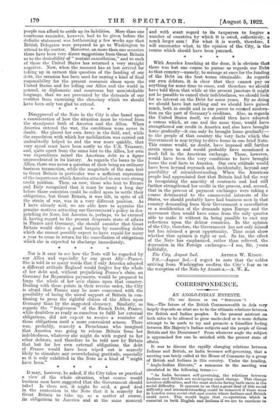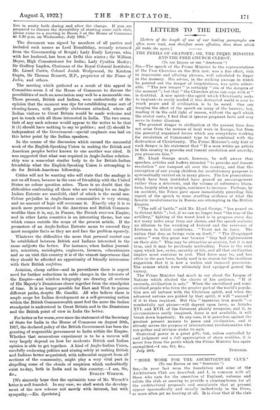CORRESPONDENCE.
AN ANGLO-INDIAN ENTENTE. rTo THE EDITOR OF THE "SPECTATOR.']
Sra,—The future of the British Commonwealth in Asia very largely depends on what are to be the ultimate relations between the British and Indian peoples. Is the present mistrust on both sides to be allowed to grow unchecked or is some definite attempt to be made to try and promote a friendlier feeling between His Majesty's Indian subjects and the people of Great Britain and the Dominions? From whatever angle the subject is approached few can be satisfied with the present state of affairs.
It was to discuss the rapidly changing relations between
Indians and British, as India becomes self-governing, that a meeting was lately called at the House of Commons by a group of British and Indians in this country. Under the beading, "Anglo-Indian Entente," a summons to the meeting was
circulated in the following terms :—
" As India becomes self-governing, the relations between Indians and British are undergoing rapid change. This change involves difficulties, and the most serious facing both races is the social difficulty. It appears to us that a great deal of this social difficulty and misunderstanding could be removed if there were in London some social club and centre where Indians and British could meet. This would begin that co-operation which in essential to both English and Indians if we are to continue to live in amity both during and after the change. If you are prepared to discuss the desirability of starting some such club, please come to a meeting in Room 5 at the House of Commons at 5.30 p.m. on Wednesday, July 19th."
The document was signed by members of all parties and included such names as Lord Ronaldshay, recently returned from the Governorship of Bengal; Lady Emily Lutyens, who, with her husband, has been at Delhi this winter ; Sir William Meyer, High Commissioner for India; Lady Cynthia Mosley; Sir Godfrey Lagden, Chairman of the Royal Colonial Institute; Mr. Lionel Curtis, Colonel Josiah Wedgewood, Sir Krishna
Gupta, Sir Thomas Bennett, M.P., proprietor of the Times of India, and others.
The meeting which gathered as a result of this appeal in Committee-room 5 of the House of Commons to discuss the possibilities of such an association may well be a memorable one. Those present, British and Indian, were undoubtedly of the opinion that the moment was ripe for establishing some sort of clearing-house, with possibly clubrooms attached, where all Indian visitors to Great Britain would be made welcome and
put in touch with all those interested in India. The two essen- tials of any such scheme would appear to the writer to be that it (1) should have nothing to say to politics ; and (2) should be
independent of the Government—special emphasis was laid on this latter point by the Indian speakers.
In the course of the discussion which ensued the successful work of the English-Speaking Union in making the British and American peoples better known to one another was cited. It was suggested that what was required in Anglo-Indian relation- ship was a somewhat similar body to do for British-Indian friendship what the English-Speaking Union is attempting to do for British-.American fellowship.
Critics will not be wanting who will state that the analogy is not on all fours, because in the case of friendship with the United States no colour question arises. There is no doubt that the difficulties confronting all those who are working for an Anglo- Indian Entente are manifold, chief of which is the racial one.
Colour prejudice in Anglo-Saxon communities is very strong, and no amount of logic will overcome it. Exactly why it is so much more pronounced in the American and British Common- wealths than it is, say, in France, the French over-sea Empire, and in other Latin countries is an interesting theme, but one which comes outside the scope of the present article. If the promoters of an Anglo-Indian Entente mean to succeed they
unlit recognize facts as they are and face the problem squarely. Whatever the difficulties the more that personal contact can
be established between British and Indians interested in the same subjects the better. For instance, when Indian journal- ists, scientists, sociologists, engineers, farmers, educationists and so on visit this country it is of the utmost importance that they should be afforded an opportunity of friendly intercourse
with their British confreres.
Aviation, cheap cables—and in parentheses there is urgent need for further reductions in cable charges in the interests of the Empire—and wireless telegraphy are drawing all sections of His Majesty's Dominions closer together from the standpoint of time. It is no longer possible for East and West to pursue different paths, despite Mr. Gandhi. All who believe there is ample scope for Indian development as a self-governing nation within the British Commonwealth must feel the more the Indian standpoint is understood in Great Britain and in the Dominions and the British point of view in India the better.
For better or for worse,ever since the atatement of the Secretary of State for India in the House of Commons on August 20th, 1917, the declared policy of the British Government has been the
granting of responsible government to India within the Empire. Whether that momentous experiment is to be a success will very largely depend on how far moderate British and Indian opinion is able to get together. A kind of Anglo-Indian Union, carefully eschewing politics and aiming solely at making British and Indians better acquainted, with influential support from all sections of the community, might play a very vital part in
dispelling some of the clouds of suspicion which undoubtedly exist to-day, both in India and in this country.—I am, Sir,
EVELYN WRENCH.
[We sincerely hope that the optimistic tone of Mr. Wrench's 'letter is well founded. In any ease, we shall watch the develop- ment of the new scheme not merely with interest, but with
sympathy.—ED. Spectator.]



































 Previous page
Previous page